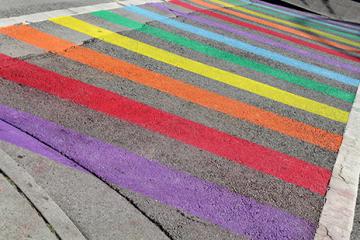Fear, isolation and discrimination common in Europe’s LGBT community

The survey was carried out by the European Union Agency for Fundamental Rights (FRA). The results underline the need to promote and protect fundamental rights for LGBT people so they too can live their lives with dignity.
“Everyone should feel free to be themselves at home, work, at school and in public – but clearly, LGBT people often don’t. Results from FRA’s survey show that fear, isolation and discrimination are common in Europe’s LGBT community,” says FRA Director Morten Kjaerum. “We need EU-wide action to break down the barriers, eliminate the hate and create a society where everyone can fully enjoy their rights, no matter what their sexual orientation or gender identity is.”
Some of the difficulties many LGBT people face include:
- Schooling: 2 out of 3 LGBT respondents were hiding or disguising being LGBT at school. At least 60% personally experienced negative comments or conduct at school because they were LGBT while over 80% in every EU Member State recall negative comments or bullying of LGBT youth at school. Therefore, Member States need to ensure LGBT students feel safe at school as this is where negative LGBT experiences, societal prejudices and exclusion often begin. This could include LGBT awareness campaigns for teachers and pupils and policies against homophobic bullying.
- Work: 19% of respondents felt discriminated against at work or when looking for a job, despite legal protection under EU law. This underlines the need for EU-wide action to counter the many obstacles LGBT people face to their basic rights in their everyday life.
- Fear: 26% of LGBT people who answered the survey had been attacked or threatened with violence in the last five years. 66% of respondents across all EU Member States were scared of holding hands in public with a same-sex partner. For gay and bisexual men respondents it was about 75%. This shows that LGBT victims need recognition and protection EU-wide and nationally to counter harassment and hate crime that results in LGBT people living in fear. This could include police training and victim support services as well as laws against hate speech and hate crime.
The survey also reveals that transgender people are the most affected among LGBT respondents to have personally felt discriminated against, particularly in employment and healthcare. About 30% said they were victims of violence or threats of violence more than three times in the year before the survey.
High levels of under-reporting of instances of discrimination and hate crime were also detected. This is despite 56% of respondents being aware of laws against discrimination on the grounds of sexual orientation or gender identity. Half of all victims of violence and harassment felt that the police would do nothing. This pattern is not unique to the LGBT group researched. FRA found such under-reporting also in other groups, for instance, among members of ethnic minorities (See FRA hate crime reports, 2012).
The survey asked LGBT people whether they had experienced discrimination, violence, verbal abuse or hate speech on the grounds of their sexual orientation or gender identity. They were also asked to identify where such incidents took place, such as at school, work, when seeking healthcare or in public places.
The analysis of the survey findings are contained in two reports. They will feed into discussions in the EU and Member States on legislation and policies to improve the situation for LGBT people.
To read the report, see:
- EU LGBT Survey results: at a glance, which breaks down the key findings with simple graphs.
For further information please contact: media@fra.europa.eu
Tel.: +43 1 580 30 642 and see the related media memo, factsheet and online data visualisation (where results for each EU Member States can be seen).
Notes to the editors:
- Over 93,000 LGBT people, aged 18 or above, from all across the EU and Croatia completed the online survey. For background on how the survey was carried out see the technical report.
- The survey results are being presented on International Day against Homophobia and Transphobia on 17 May 2013, at a conference hosted by the Netherlands government in the Hague.
- FRA has conducted socio-legal research since 2007 on the fundamental rights of LGBT people. See LGBT section for more information.
- The European Union Agency for Fundamental Rights (FRA) provides evidence-based advice to EU and national decision makers, thereby contributing to more informed and better targeted debates, policies and laws on fundamental rights.